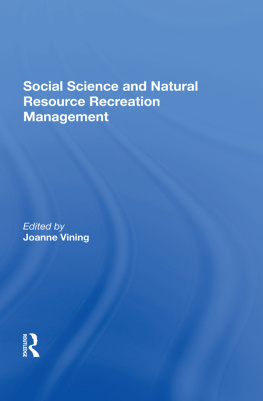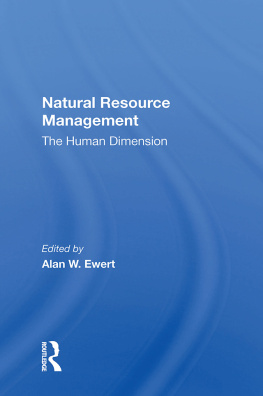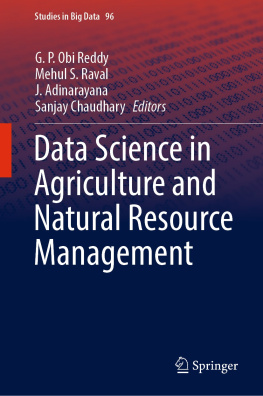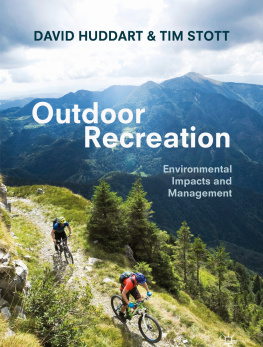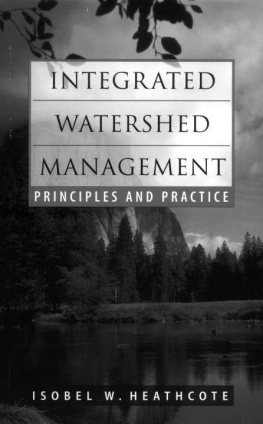SOCIAL BEHAVIOR AND NATURAL RESOURCES SERIES
Donald R. Field, Series Editor
Social Science and Natural Resource Recreation Management, edited by Joanne Vining
Economic Valuation of Natural Resources: Issues, Theory, and Applications, edited by Rebecca L. Johnson and Gary V. Johnson
Community and Forestry: Continuities in the Sociology of Natural Resources, edited by Robert G. Lee, Donald R. Field, and William R. Burch, Jr.
Social Science in Natural Resource Management Systems, edited by Marc L. Miller, Richard P. Gale, and Perry J. Brown
About the Series
The Social Behavior and Natural Resources Series is about human adaptation to natural resources and the constraints these resources place upon institutions and work and play in everyday life. Natural resources, after all, are products of society. The very definition of natural resources arises from the interaction of population, culture, and the biophysical environment.
Biological and physical scientists are providing us with a clearer picture of the nature of species and habitats and the requirements of systems to function under varying management regimes dedicated to conservation and preservation. Social scientists are providing complementary information about the human species, our habitat, and how social systems respond to a wide range of resource management policies. The integration of social science with biological and physical science is the focus of this series.
Resource management issues are human problems that can only be solved with social science knowledge in combination with knowledge from the other sciences. The utilization of these different types of knowledge within the resource management arena depends upon the establishment of a partnership between scientists and managers. Sound management requires agreement on what information is pertinent, how information should be collected, and how information should be employed in decisionmaking.
Here the social sciences can help. Social scientists have a keen appreciation of the power, as well as the limitations, of science to resolve policy conflicts. This is important for understanding how managers filter the concerns of competing constituencies and their own professional cadre while managing the natural resources under their charge.
Social Behavior and Natural Resources Series
First published 1990 by Westview Press
Published 2019 by Routledge
52 Vanderbilt Avenue, New York, NY 10017
2 Park Square, Milton Park, Abingdon, Oxon OX14 4RN
Routledge is an imprint of the Taylor & Francis Group, an informa business
Copyright 1990 Taylor & Francis
All rights reserved. No part of this book may be reprinted or reproduced or utilised in any form or by any electronic, mechanical, or other means, now known or hereafter invented, including photocopying and recording, or in any information storage or retrieval system, without permission in writing from the publishers.
Notice:
Product or corporate names may be trademarks or registered trademarks, and are used only for identification and explanation without intent to infringe.
Library of Congress Cataloging-in-Publication Data
Social science and natural resource recreation management/edited by
Joanne Vining.
p. cm.(Social behavior and natural resources series)
Includes index.
1. Outdoor recreationManagement. 2. Natural resources
Management. I. Vining, Joanne. II. Series.
GV191.66.S63 1990
333.78dc20
89-14747
CIP
ISBN 13: 978-0-367-28761-0 (hbk)
Contents
H.W. Schroeder
R. Schreyer
S.M. Meis
J.F. Dwyer and R. Hutchison
S.D. Moore, J.W. Shockey and S.K. Brickler
S. Hollenhorst
R. Rollins and D. Chambers
R.J. Lichtkoppler and H.A. Clonts
R. Graham and R.J. Payne
R.J. Glass, R.M. Muth and R. Flewelling
S.E. Daniels and RS. Krannich
B.A. Wright, H.K. Cordell and T.L. Brown
M.F. Price
E. Val
D.J. Stynes and G.L. Peterson
D.M. Donnelly, C. Sorg-Swanson, J.B. Loomis and L.J. Nelson
T.C. Brown, M.T. Richards, T.C. Darnel and DA. King
H.A. Clonts and J.W. Malone
Throughout history natural environments have been important sources of human inspiration, solace, and adventure. From the backyard garden to the Amazon expedition, recreational activities in outdoor settings are sought by millions of people. Moreover, human well-being has been linked with a range of interactions with nature, from simply being able to see trees from a hospital room to the therapeutic effects of outdoor challenge experiences. Whereas it is clear that people want outdoor recreation experiences, it is becoming evident that they also need them.
Natural environments afford such powerful positive experiences, in fact, that many are in danger of being loved to death. The present recreational use of parks, public lands, and other natural areas is intensive, and is projected to increase in the future. Managing these natural resources to enhance recreation experiences, diminish conflict among users, and protect the environment is a complex and daunting task. Using social science research to understand the perceptions, attitudes, satisfaction, and behavior of the public, whether they are recreationists, local residents, or managers themselves, is critical to intelligent, effective management and planning.
Social scientists interested in the interaction between people and outdoor recreation environments were among the first to systematically study social and behavioral aspects of natural resource uses. Over the past three decades social scientific research on natural resource recreation issues has generated a body of knowledge which is now actively used in the management of recreation opportunities. Three intellectual threads or themes have emerged from this body of knowledge: the ecology of behavior and social interactions; the interrelationship between values, behavior, and culture; and the social composition and institutional structure of natural resource recreation participants and organizations.
Social scientists conducting outdoor recreation research soon recognized the complexity of the balance between behavior and setting. It became clear very quickly that one needed to understand the context of social interactions and behavior in order to manage a setting to optimize experiences and satisfaction as well as to protect the resource. This orientation can be seen in management formats such as the Recreational Opportunity Spectrum, which emphasizes finding a fit between human activities, expectations, and the nature of the space that they use. The ecology of behavior is also the foundation for studies of carrying capacity and to a lesser extent, studies of the relationship between characteristics of the recreation setting and satisfaction with outdoor experiences. Although much of the empirical work on the ecology of behavior has been driven by the need for management applications, this theme is also represented in recent theoretical work which seeks a basic understanding of the relationship between people and nature.
The second major theme of outdoor recreation research underscores the importance of human values and attitudes in the search for high quality outdoor recreation experiences. Each individual comes to the outdoor recreation experience with a set of attitudes and expectations which are determined by a complex variety of factors. These factors might include past experience with the setting or with similar areas, reports of the experiences of others in that setting, values associated with a particular activity or social group, cultural values, and the image of the setting that is projected by advertising, formal agency public relations, or information programs. Empirical and theoretical work in this area has focused on the relationship between attitudes and expectations, outcomes, and evaluations of outcomes. Applied empirical research has been designed to aid in devising communication, educational and management strategies which enable individuals to optimize the quality of their experiences and reactions while preserving or even enhancing the resource.

